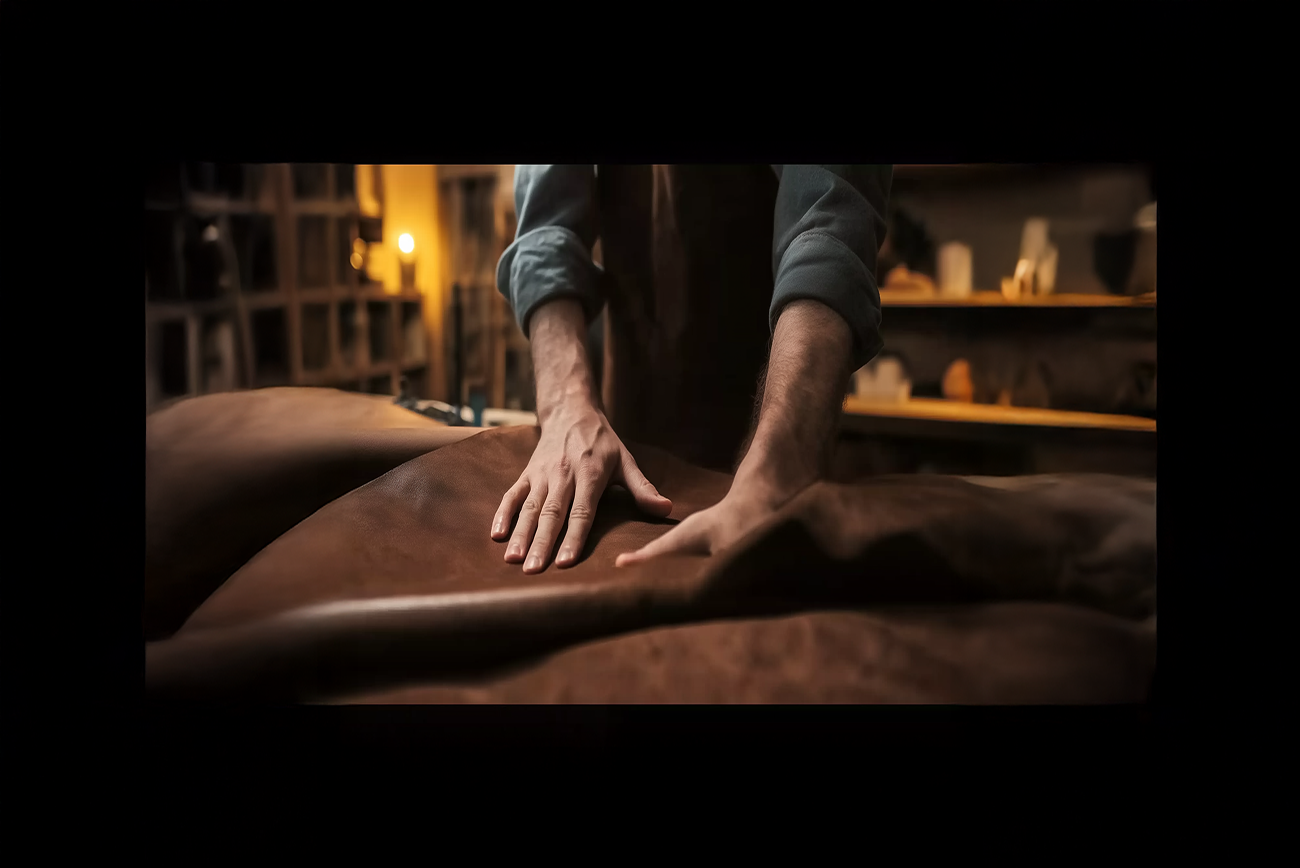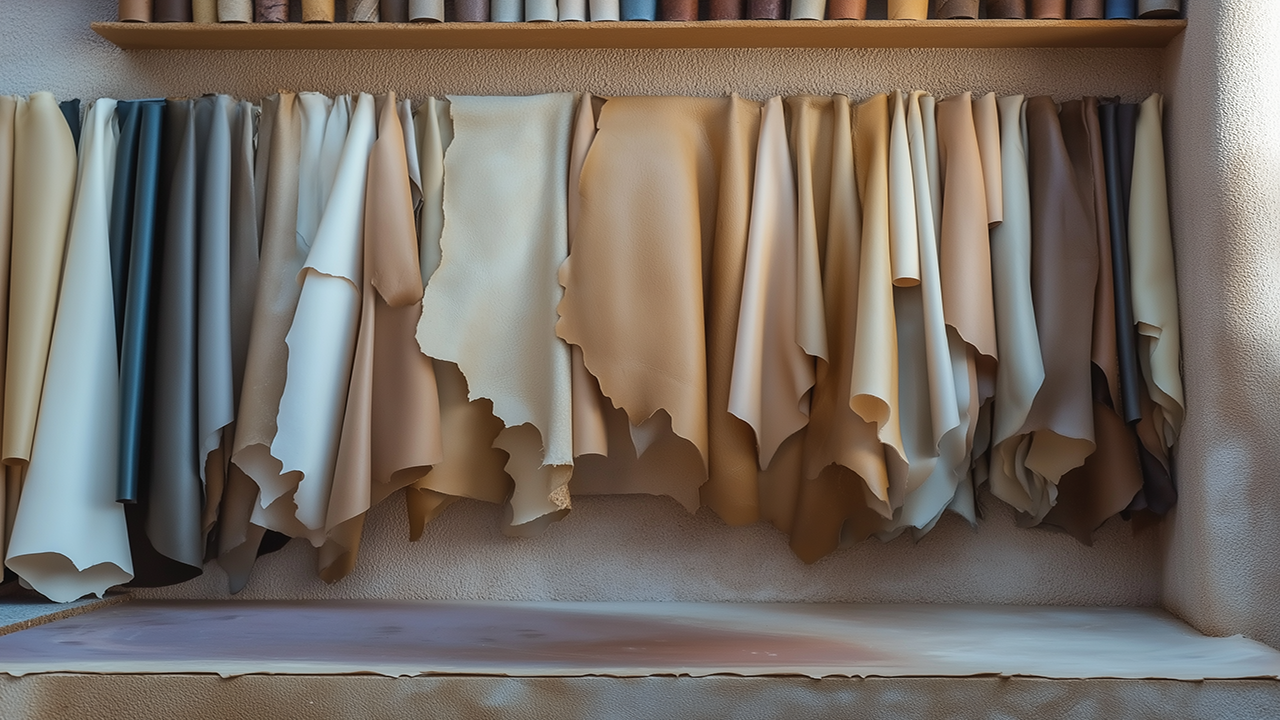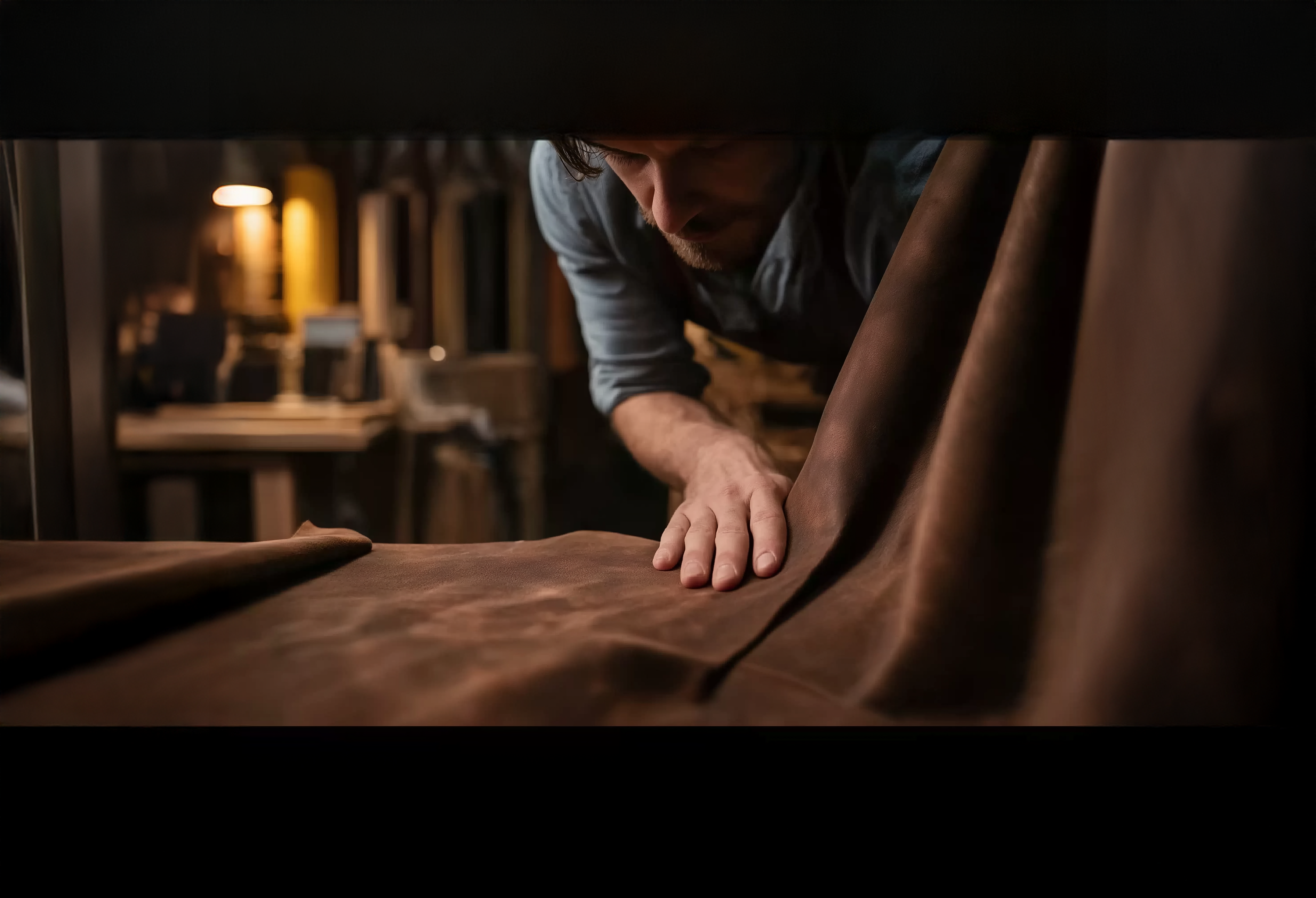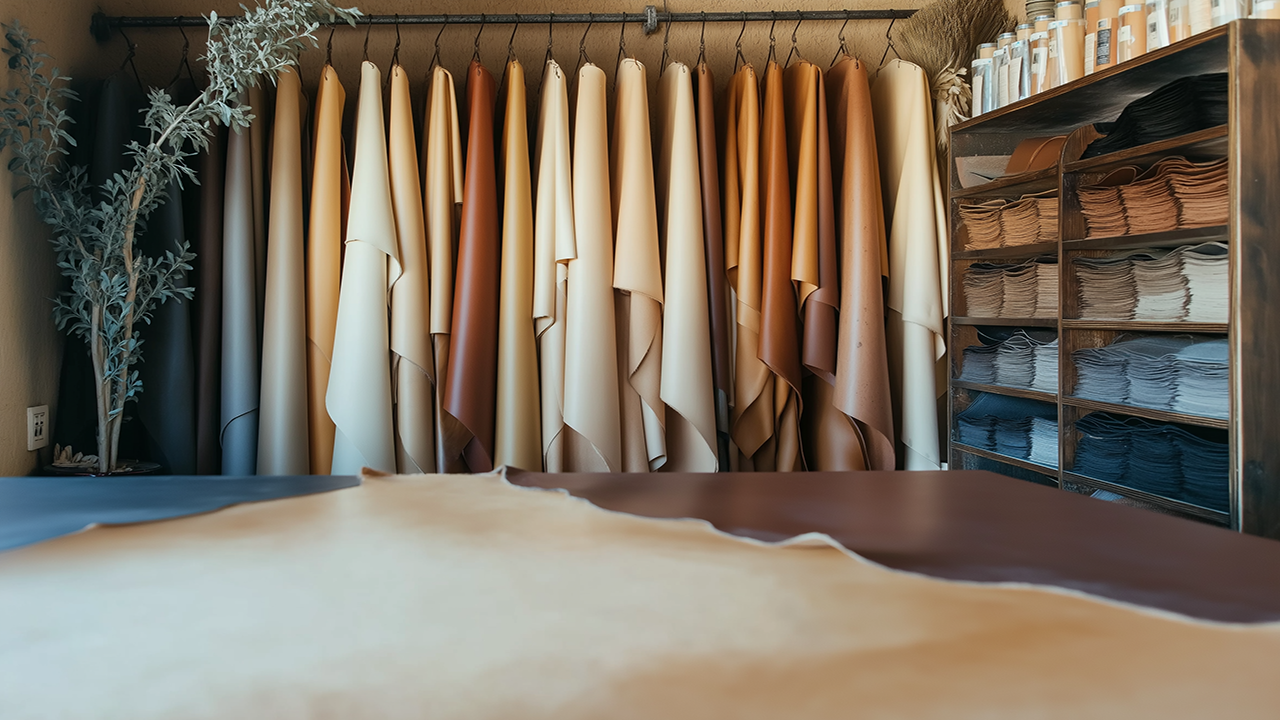


From biotechnology labs to luxury fashion ateliers, from startup ecosystems to the R&D centers of heritage brands, this transformation marks more than a shift in materials—it signals a moment when the very idea of consumption, especially in the context of luxury, is being redefined. In this article, we explore the technical and cultural metamorphosis of leather in the age of sustainability, guided by the latest research and industry data.
The traditional leather industry has reached a point where its environmental impact and ethical concerns can no longer be ignored. Data from the Leather Working Group (LWG) reveals the current structure of the sector is fundamentally unsustainable. Nearly 1 billion animals are used annually for this industry. The chemicals involved in tanning contaminate groundwater, water usage is high, and carbon emissions are significant—this is the dark underbelly of a cornerstone of the luxury world. Yet, advancements in biotechnology offer a compelling vision for the future of this long-established industry. From DNA engineering to microorganism-based manufacturing, from synthetic biology to advanced material sciences, new breakthroughs are enabling a redefinition of what leather is and how it can be created.
Cell-based production technologies are centered on synthesizing collagen protein directly in laboratory conditions. In the field pioneered by Modern Meadow, genetically engineered yeast cells are designed to produce collagen. This collagen then undergoes a specialized extraction and processing phase to become the fundamental building block of leather. This technology not only eliminates dependence on animal sources but also allows for control over leather’s physical properties at the molecular level.

Microorganism technologies, on the other hand, use fungal mycelium networks to create leather-like materials. MycoWorks’ Fine Mycelium platform cultivates these networks under controlled conditions and transforms them into a material that mimics the tactile and structural qualities of traditional leather. Unlike tanning, this process consumes minimal water and produces zero toxic waste. Scientific studies show that mycelium-based materials are approaching the mechanical durability of natural leather—and are improving rapidly.
Plant-based approaches rely on renewable biomass and agricultural byproducts. Mexican biotech company DESSERTO, for example, developed a vegan leather alternative made from cactus leaves and achieved significant reductions in water usage. Compared to traditional leather production, their model consumes dramatically less water and offers a more sustainable path forward. Similarly, Piñatex, developed by Ananas Anam, is a material made from the fibers of pineapple leaves. This approach transforms agricultural waste into a valuable raw material, merging the principles of circular economy with material science.
The market penetration of these technologies is growing at a remarkable pace. According to a Grand View Research report, the alternative leather market reached a valuation of approximately $1.5 billion in 2023 and is projected to grow at an annual rate of 7–9% through 2030. The luxury segment, in particular, has positioned itself as an early adopter of these innovations. Investment trends follow suit, with startups attracting new waves of capital.

Let’s turn to our own fields. The beauty industry is adopting sustainable leather alternatives on two distinct fronts: as a physical material in packaging and accessory design, and as a symbolic and olfactive note in perfumery. This dual transformation introduces a new dimension to the industry’s understanding of sustainability.
Cosmetic brands are rethinking their entire accessory portfolios—from product packaging to makeup bags, from brush sleeves to travel kits. Luxury cosmetic houses are beginning to incorporate sustainable materials into their accessory collections. Vegan and eco-conscious leather alternatives are now favored for items like brush holders and organizers. High-end skincare brands are adopting sustainable strategies in their packaging design. Plant-based and biodegradable materials are being introduced into luxury cosmetic packaging, helping reduce the environmental impact of packaging waste.
Professional makeup brands are updating their carrying cases and organizational accessories with sustainable materials—offering durability for professional use while minimizing ecological impact.
In perfumery, the scent of leather has long symbolized luxury and sophistication. Leaving aside the Medieval and Early Modern periods, we face a modern legacy that stretches from Chanel’s Cuir de Russie (1924) to Tom Ford’s Tuscan Leather. But the formulation techniques behind this legacy are now being reshaped to meet the demands of a sustainable era.
Traditional leather notes were built on combinations of animal-derived materials and synthetic molecules. Today, modern perfumery is reimagining this classic accord through three primary approaches: biotechnological molecules, green chemistry, and upcycled materials.

Firmenich, for instance, is developing sustainable scent molecules through biotechnological innovation. Research in this field focuses on creating new molecules that capture the character of leather without relying on animal sources—and they are gaining traction. At Gülçiçek, we too are investing in sustainable raw material research, developing formulations inspired by local resources. We’re blending Anatolia’s traditional knowledge with modern sustainable perfumery techniques.
The upcycling approach is also opening new terrain in perfumery. Natural components derived from industrial by-products are being processed through specialized extraction techniques and integrated into fragrance compositions. This not only minimizes waste but also generates unique olfactive profiles. Luxury perfume houses are embracing this shift. Leading brands are launching collections formulated with sustainable ingredients. These sustainable versions of classic scents meet both aesthetic expectations and environmental concerns. Pioneer perfumers are developing new perspectives on sustainable perfumery—favoring fewer ingredients, more sophisticated profiles, and aesthetics that exist in harmony with nature. We’re observing this evolution closely.
Before we close this section, we must mention the remarkable work being done by The Estée Lauder Companies. Taking a broader view beyond leather itself, the group has transformed 71% of its brand packaging to be recyclable, refillable, or reusable. By reducing water consumption in its production facilities by 23%, it achieved its 2025 target ahead of schedule. It now operates on 100% renewable electricity across global operations and became the first beauty company to join the “Supplier Leadership on Climate Transition” initiative toward its Net Zero emissions goal.

Through green chemistry, the company has pivoted toward microplastic-free, biodegradable, and renewable-source ingredients—reducing reliance on petroleum-based components and replacing synthetic materials with more sustainable alternatives. Aveda chemists saved 350,000 kg of materials over five years by substituting synthetic conditioning agents with nature-friendly options. La Mer invests millions in ocean conservation, Origins supports global reforestation efforts, and Aveda leads projects to improve access to clean water.
Let’s conclude. As we noted at the start, leather—one of humanity’s oldest luxury materials—is not just experiencing change, it is undergoing a radical transformation. And this transformation is not simply a matter of replacing one material with a sustainable substitute. What we are witnessing is a deep paradigm shift: a redefinition of the material itself, a rewriting of our relationship with nature, and a questioning of what luxury truly means.
We now see that the new materials emerging from biotechnology labs can no longer be defined as merely “alternative” or “artificial.” With a multidisciplinary approach that stretches from DNA engineering to synthetic biology, from microbiology to nanotechnology, we are now capable of redesigning materials at the molecular level. This is no longer mimicry—it is a form of mastery rooted in understanding and reinterpreting the mechanisms of nature itself.
INTRODUCTION
Gülçiçek Kimya ve Uçanyağlar San. ve Tic. A.Ş. (“GÜLÇİÇEK”), is an organization that adheres to all legal regulations, corporate codes, code of business conduct, and ethical rules. The term "GÜLÇİÇEK" ("we" or "ours/us" or "our") is used in this text to refer to GÜLÇİÇEK and all of its subsidiaries.
GÜLÇİÇEK has a contractual relationship with you as the data controller operating the website you visit. Data belonging to an identified or identifiable real entities are qualified and protected as personal data in accordance with Law on Protection of Personal Data No. 6698 ("LPPD") and the secondary legislation based on it, as well as the decisions of the Personal Data Protection Board ("Board") (hereinafter collectively referred to as "Turkish Data Protection Legislation").
GÜLÇİÇEK is committed to processing, securing, and respecting all personal data relating to real entities, i.e. Individuals, who visit our website or who wish to contact us through our website, in accordance with the Turkish Data Protection Legislation. We present this data privacy statement for your information so that you can understand how we will process individuals' personal data for the purposes of executing agreements and managing customer relations.
LAWFULLY PROCESSING OF YOUR PERSONAL DATA
Personal data of individuals are processed in line with thelegitimate interests (*)of GÜLÇİÇEK because they are directly related to the establishment or performance of the agreement (**) between you and GÜLÇİÇEK due to your use of the website. It is in GÜLÇİÇEK's legitimate interest to manage the performance of the agreement to which GÜLÇİÇEK is a party and to evaluate requests and complaints.
PURPOSE OF PROCESSING PERSONAL DATA
We process personal data for the following purposes:
1) Performance of Customer Satisfaction Activities,
2) Execution of Agreement Processes,
3) Execution of Internal Audit/ Investigation/ Intelligence Activities,
4) Execution/ Supervision of Business Operations,
5) Fulfillment of Legal Notification Obligations.
TYPES OF PERSONAL DATA WE COLLECT
Our Company processes the general personal data of the Individuals consisting of the following personal data types during their visits and applications made on the website www.gulcicek.com.tr for the reasons mentioned above; i) Identity information (Name-Surname), ii) Contact information (Mobile Phone Number, E-mail address), iii) website visit information (IP address, cookies records, permission/consent records, browsing records, log information) and iv) other information that you prefer to provide to us within your message sent to us.
PERSONAL DATA SOURCES
We collect the above-mentioned personal data directly from the Individuals who reach our company by visiting the GÜLÇİÇEK website.
TO WHOM ARE YOUR PERSONAL DATA TRANSFERRED?
In connection with the management of the contractual relationship between us and individuals, we can at any time disclose personal data to a service provider who processes data on our behalf under a service and confidentiality agreement. We do not share the personal data we collect with third parties other than our data processors.
Personal data of individuals are securely processed and stored in local and global data processing systems for financial, contractual, and supplier management purposes, which are used by GÜLÇİÇEK to carry out its operations and transactions effectively.
It is our Company's responsibility to obtain explicit consent from all Individuals whose personal data are processed, in accordance with the Turkish Data Protection Legislation, if necessary, for the processing of their data on GÜLÇİÇEK's domestic data recording systems, and in any case, to inform the Individuals in accordance with the procedures and principles determined under the Communique on Principles and Procedures to be Followed in Fulfillment of the Obligation of Clarification for any data processing activities to be carried out using the GÜLÇİÇEK systems.
HOW LONG WE STORE PERSONAL DATA
We process and retain the personal data of individuals throughout our use of the GÜLÇİÇEK website and as long as the agreement, if any, is in force between you and us. In addition, we continue to store the personal data of individuals for 10 (ten) years after the termination of the agreement between you and GÜLÇİÇEK in accordance with the statute of limitations specified in the Turkish Code of Obligations No. 6098, for our legitimate interests (***). However, within a retention period of 10 (ten) years after the termination of the agreement, we retain personal data in such a way that only certain persons can access it by applying authorization restrictions.
MAINTAINING PERSONAL DATA SECURE
It is our top priority to maintain individuals' personal data secure. Personal data is securely stored either by us or by our carefully selected service providers, who act as data processors under a service and confidentiality agreement. We ensure that strict security measures are in place to keep personal data safe from unauthorized access or disclosure, as well as loss and misuse. We take care that the technical and administrative measures we take in terms of security meet the measures required to be taken in accordance with the Turkish Data Protection Legislation.
DATA PROTECTION RIGHTS OF INDIVIDUALS
Pursuant to Turkish Data Protection Legislation, Individuals may, at any time, apply to GÜLÇİÇEK for any information pertaining to themselves;
a) To learn whether their personal data are processed or not,
b) To demand information as to if their personal data have been processed,
c) To learn the purpose of the processing of their personal data and whether these personal data are used in compliance with the purpose,
d) To know the third parties to whom their personal data are transferred in the country or abroad,
e) To request the rectification of the incomplete or inaccurate data, if any,
f) To request the deletion or destruction of their personal data,
g) To request reporting of the operations carried out pursuant to sub-paragraphs (d) and (e) to third parties to whom their personal data have been transferred,
h) To object to the occurrence of a result against the person himself/herself by analyzing the data processed solely through automated systems,
i) To claim compensation for the damage arising from the unlawful processing of his/her personal data.
EXERCISE OF RIGHTS REGARDING PERSONAL DATA
Each data subject whose data is processed pursuant to the instructions of the data controller GÜLÇİÇEK has the right to apply to the data controller in accordance with Article 13 of the LPPD to exercise his/her rights set forth in Article 11 of the LPPD. GÜLÇİÇEK, the data controller, is obliged to accept or reject this application within 30 (thirty) days at the latest, provided that it explains its reasoning. However, in order for this application to be considered a proper application, it must meet all of the elements regulated in the Communique on the Procedures and Principles of Application to the Data Controller.
For an application made by any data subject to be recognized as a valid application, it must be made:
• in writing in Turkish language by the data subject himself/herself by presenting his/her identity card; or
• through registered electronic mail (REM) address, secure electronic signature, or mobile signature; or
• by using the e-mail address previously notified to GÜLÇİÇEK by the data subject and recorded in GÜLÇİÇEK's system; or
• by means of a software or application developed by GÜLÇİÇEK for the application purposes
Again, in order for an application to be accepted and considered a proper application, it must contain all of the followings:
• Name, surname, and -if the application is in writing- handwritten signature of the data subject.
• Turkish identity number for citizens of the Republic of Türkiye, nationality for foreigners, passport number or identity number, if any,
• Residential or business address for notifications,
• E-mail address, telephone, and fax number for notifications, if any,
• The subject of the request of the data subject.
Therefore, to exercise the rights granted to data subjects under Article 11 of the PDPL, an application bearing the contact and address information in this Policy and containing all of the elements set out in the Communique on the Procedures and Principles of Application to the Data Controller must be submitted to GÜLÇİÇEK using one of the following methods: registered mail with return receipt requested, in person, via an email address registered in GÜLÇİÇEK's systems, or by electronic mail with a secure electronic signature.
IN THE EVENT OF YOUR INQUIRIES
If you are dissatisfied with our data processing ways, wish to make a complaint, or want to receive information or ask a question on any matter you do not understand, you may contact the Data Protection Officer at any time. (E-mail: kvkk@gulcicek.com.tr)
--- --- ---
(*) Regulated as one of the conditions that make it possible to process personal data without the explicit consent of the data subject pursuant to Personal Data Protection Law No. 6698, Article 5, paragraph 2, subparagraph f).
(**) Regulated as one of the conditions that make it possible to process personal data without the explicit consent of the data subject pursuant to Personal Data Protection Law No. 6698, Article 5, paragraph 2, subparagraph c).
(***) Regulated as one of the conditions that make it possible to process personal data without the explicit consent of the data subject pursuant to Personal Data Protection Law No. 6698, Article 5, paragraph 2, subparagraph f).